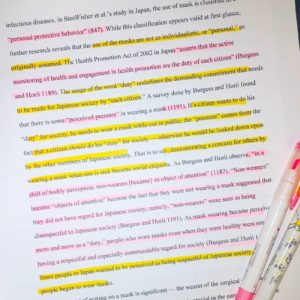As a Writing Center fellow, I definitely have conferenced my share of writing seminar essays, and I know that there are a lot of common themes that first years worry about. In this post, I wanted to make a checklist of exercises to try before you submit your final draft!

- Use two different highlighters and highlight parts in your essay that are direct quotations from your primary source and others that are your original analysis. Do you have a good balance of each?
The purpose of this exercise is to make sure that your essay has a good balance of direct quotation and actual analysis of those quotations. While it’s easy to write down a quotation and feel like you’ve used a primary source, you actually haven’t analyzed anything until you explain the significance of that quotation.
When I write my essays, I directly quote the primary source first, then paraphrase that in my own words; it helps the reader when you reemphasize the idea (who actually understands Hobbes on the first try?). Then, I finally go through and analyze particular words that are used in that direct quotation. Why did that author use the word “attack” instead of “confront?” What are the implications of that specific word?
- Go through each of the direct quotations in your essay, and verbally explain what that quotation adds to your argument.
This is another exercise to make sure that you have direct in-text analysis in your essay, and that each quotation extends your argument and doesn’t just evince it. What new idea does the quotation introduce or suggest?
- Is there clear separation between your own words and those of others? Highlight each side of the argument.
The purpose of this is pretty self-explanatory. You want to make sure that your essay has an original argument and isn’t just a summary of the existing academic conversation. This is a great way to visualize whether you were able to actually write about your own ideas in the essay.
- Identify the key terms that you use in your paper and make sure that they are clearly defined and can be categorized/ linked in a logical way.
This exercise makes sure that you have an overarching theme in your essay and that it’s clear to your readership. Your first essay in writing seminar probably asked you to identify key terms in a primary source. Now do it for your other essays! Do you have a particular theme in your thesis that you continue to emphasize throughout your paper? Would someone with no background knowledge in that topic be able to understand your paper? (They should be able to if you clearly define your terms!)
- Copy all your topic sentences and paste them into a paragraph form. Do each of the sentences make an argument? Do your paragraphs all flow together logically?
This is my favorite exercise! It makes sure that your topic sentences actually argue an idea, and that you’re furthering your argument with each paragraph. Even if someone were skimming your essay, they should get the main takeaway!
—
If you feel like you need help in answering any of these questions, you should go to the Writing Center. It’s completely free and you get to have a 50-minute one-on-one conference with another student who can help you be critical and reflective about your essay. You also don’t need to have any writing done to come to the Writing Center — come in even if you just want to brainstorm about a prompt! Make an appointment here.
(If you want to look at good examples of academic writing for each lexicon term you learned in class, you should check out the Tortoise: A Journal of Writing Pedagogy.)
Happy editing!
–Nanako Shirai, Natural Sciences Correspondent

